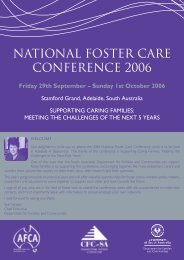Supporting Carers Of Other People's Children - Australian Foster ...
Supporting Carers Of Other People's Children - Australian Foster ...
Supporting Carers Of Other People's Children - Australian Foster ...
- No tags were found...
You also want an ePaper? Increase the reach of your titles
YUMPU automatically turns print PDFs into web optimized ePapers that Google loves.
Laurel,LaurelJennie’s MumNone of the family knew just how hard raising thesefour children would be. Laurel, Jennie’s mother, saysshe was not told by the Family Services Departmenthow high their needs were. The middle boy, Toby, hascerebral palsy, epilepsy and a mental illness, althoughhis age precludes a proper diagnosis.The youngest, Charlie, is now 12, not fully toilettrained,and ‘masturbates constantly’. ‘It makes it reallydifficult if you want to go out for coffee,’ says Laurel.The relationship with the eldest, Julie, has all butbroken down. She has left home and is in and out ofthe juvenile justice system. ‘I know that Jennie stillworries about her.’Laurel says she would not have taken the children on ifthey’d been the same ages as her own children. ‘It wouldhave been really hard with my girls, to treat them as equal with kidswho are disadvantaged and have got disabilities.’Instead, her two daughters have been able to ease the burden.‘Jennie just threw herself into it. She’s receptive to anyone, andshe likes to mother, nurture and teach. She’s always teaching thempainting or something or other.’‘Kristie, my older daughter, is not so child-focussed. But even nowwhen she’s playing softball, for instance, she’ll take the youngestfellow with her to the games.’Both girls, as young teens, received the same intensive trainingthat their parents had, for three weeks before the children arrived.Ever since, Jennie has been attending meetings and doctors’appointments with her parents, listening and taking notes. Heradvocacy has led to roles in youth policy and job selection panels.Her sister Kristie worked in Centrelink for some years, and was asource of information for the foster care community. Laurel believesher daughters’ fostering experience has given them important lifeskills, knowledge of systems, and an awareness of the problemsfaced by a sector of the population they might not have otherwiseencountered.Was there ever resentment? Laurel doesn’t think so. She says thather daughters’ lives improved because she stopped working andwas there when they came home from school. Occasional holidaysand ‘adult time’, for the original family, are still possible duringrespite care.‘<strong>Foster</strong>ing has made the kids stronger, and more tolerant. And allthree of them talk about “my brothers and sister”.’15



